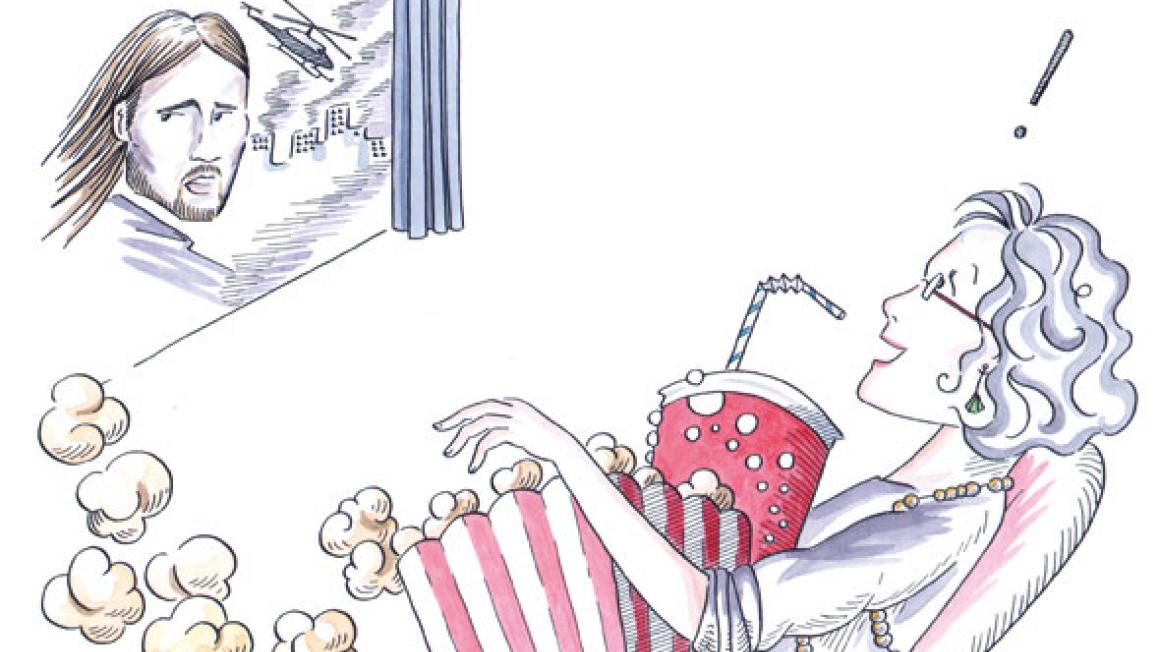Flicks or Theatre?
‘I can’t imagine the Young Vic could even come close to rivalling our Coach-House Players,’ Deirdre says. ‘Christine Bagshott was incomparable as Nora.’
{acepolls 69}
‘She won’t see 50 again,’ Ted says returning gloomily with a packet of his least favourite, plain digestives.
‘Don’t be ageist, Ted,’ Deirdre says severely.
‘At 82 I’ll be as ageist as I like.’
‘So, how was…’ Deirdre curls her lip, ‘World War Z?’
‘A bit far-fetched,’ I concede.
‘Nonsense,’ Ted says, kicking me under the table, ‘Brad Pitt is a firstrate act-or.’ He pronounces it like this to annoy Deirdre. Ted and I, who agree on nothing, including whether the sun rises in the east or the west – Ted insists this depends on which way one is facing at the time – both agree that Deirdre is a theatre snob.
Wanting to share our enthusiasm for the cinema, we once took her to see The Hours – not a film either of us would have chosen for ourselves. I enjoy romcoms while Ted goes for high-speed car chases and mayhem.
‘The local paper says, ‘A deeply moving film’, Ted told me. ‘Sounds as dull as ditch water but it might suit Deirdre.’
Nothing suited Deirdre. Before the film had even started, she behaved as if we’d taken her to a dockside dive.
‘Why is the floor adhering to the soles of my shoes?’ She wanted to know.
‘That is the way of cinema floors,’ Ted replied enigmatically.
Deirdre considered the audience and then said loudly, ‘Is it any wonder these people are obese? They shouldn’t be allowed to consume that amount of popcorn.’
The film began. Virginia Woolf (Nicole Kidman) had no sooner put a rock into her coat pocket and stepped into a river, before Deirdre leant across Ted to hiss at me, ‘Someone is eating sausages.’
‘It’s a hot dog. They sell them at the counter.’
Deirdre stood up. ‘I refuse to sit in an enclosed area with the smell of sausages.’

On the way home, Deirdre admitted that she might get the film out on DVD, although it had been patently obvious that Nicole Kidman was wearing a false nose.
‘Prosthetic attachment,’ Ted said.
‘That’s quite enough of that sort of language,’ Deirdre snapped.
Possibly my theatre trips have not always been well chosen.
There was the local production (the Coach-House Players have a lot to answer for) of several of Alan Bennett’s Talking Heads monologues, which left Ted and me entertaining thoughts of suicide. There was the disappointment we felt towards the end of the musical Little Shop Of Horrors when it became evident that the giant plant was going to eat the entire cast.
Finally, there was The Woman In White. ‘It’s a ghost story,’ I told Ted.
‘I hope it’s a proper frightening ghost story. I don’t want a romance with people falling in love beyond the grave, etc.’
From the programme I read out, ‘It’s a masterly piece of Victorian suspense that tells a gripping story.’
Three minutes in, Ted begins to shift uneasily. ‘When are they going to stop singing?’
I reread the programme. ‘Correction. It’s a masterly piece of Victorian suspense made into a musical. Sorry Ted. Shall we give them another 10 minutes?’
‘No, I’ve had enough.’

‘Aha!’ Ardent theatre-goers may be shaking their heads and saying to each other, ‘With the exception of Alan Bennett, these don’t represent proper the-atre. She should try Shakespeare, Pinter, Ayckbourn and Rattigan.’
But making the wrong choice rarely matters to the true film buff. Even a diabolically bad one can be enjoyed and discussed enthusiastically afterwards. I still recall fondly my ‘worst film of all time’ where Philip Seymour Hoffman becomes addicted to the smell of gasoline, sneaking around garage forecourts in search of a fix while looking deranged. Hated at the time – loved in retrospect!
Deirdre insists that her theatregoing experience requires nothing between herself and The Play, which means she has to sit in the front or second row. Ted and I insist that we are happy to sit almost anywhere, with aisle seat for Ted to easily access the dubious cinema facilities. We want ice-cream tubs, packets of chocolate-covered peanuts for me and wine gums for Ted who is not a chocolate person, whereas Deirdre takes in soft mints wrapped in a clean handkerchief to minimise noise.
Deirdre requires absolute silence. Even someone suffering from a chronic bronchial condition receives a disapproving stare. If the coughing continues she follows this up with a terse, ‘Please be quiet.’ If a mobile phone goes off, she is incandescent.
‘Everyone is incandescent. Even such luminaries as Kevin Spacey and Dame Helen Mirren’ – Deirdre pats her hair and smiles as if Kevin Spacey and Dame Helen are close personal friends – ‘have interrupted the play if there is noise in the auditorium.’
Wanting to share her enthusiasm for the theatre, Deirdre once took us to see a Japanese Kabuki play, which ran for over five hours. As we staggered out into the foyer Ted asked, ‘What was that all about then?’
Deirdre replied, ‘If you didn’t comprehend “what that was all about” Ted, I doubt I am capable of enlightening you.’ She’d marched off to buy a restorative gin and tonic only to find the bar had closed an hour earlier.
Ted, showering biscuit crumbs over my laptop, asks, ‘What about the independent cinemas? Where they take in bottles of Merlot and fresh salmon sandwiches. That lot get up my nose as well.’
Ted has a point but I will finish on Deirdre and film actor Brad Pitt: ‘He looks like a monkey,’ Deirdre says.
‘We like him looking like a monkey.’
‘But he couldn’t act his way out of my Debenhams carrier bag.’
‘Deirdre, we don’t mind.’
Always You, Edina, by VG Lee (Ward Wood Publishing, £9.99).


